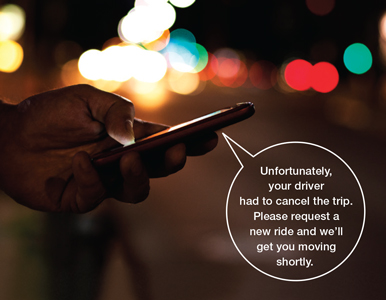
It’s one of the marvels of modern transportation. Whip out your phone, tap on a ridesharing app, and a car shows up to take you wherever you want to go. But if you’re a person of color, there’s a greater chance that a driver will cancel on you than if you’re white.
That’s one of the conclusions Kogod School of Business professor Chris Parker and his colleague arrived at after conducting a study of bias among drivers for a popular ridesharing service.
Parker and Jorge Mejia of Indiana University called 3,200 rides on a major ridesharing platform over about six weeks in fall 2018. (Because evidence suggests that many drivers work for multiple services, the researchers did not reveal the name of the company they used.) All the requests came from the same Metro station, and the destination was always Ronald Reagan Washington National Airport. They created accounts and randomly varied the photos and names of the people requesting rides.
They used four pictures to create the profiles: one for an African American woman named Keisha or Latoya, one for an African American man named Rasheed or Jamal, one for a white woman named Emily or Allison, and one for a white man named Brad or Greg. They also added a rainbow flag to some of the photos to signal support for the LGBTQ community. Each passenger had a 4.8 rating (out of 5.0).
“Our measure of bias is how often a driver actively canceled on a rider within three minutes,” says Parker, a professor of information technology and analytics. “We actually found no bias against females, but we found the rider is 2.5 to 3 times more likely to be canceled on if they are a minority than if they are Caucasian. If there’s a rainbow filter then they’re about 1.5 times more likely to be canceled on.”
Parker was curious as to whether the same biases would hold true during busier hours, when drivers receive more money because demand for rides is higher.
“For underrepresented minorities there is a clear reduction in bias during peak times,” he says. “However, for people that signal support for the LGBTQ community, there’s no difference between peak and nonpeak, at least statistically speaking.”
The researchers’ paper, “When Transparency Fails: Bias and Financial Incentives in Ridesharing Platforms,” was published in Management Science in September 2019. At least one ridesharing company has tried to address the problem by ensuring that drivers don’t see riders’ photos or names when they receive a request, but that only pushes the problem to later in the process, Parker argues.
“Instead of saying Chris needs a ride in this general location, it says someone needs a ride in this general location,” he says. “It completely solves the problem of people of color taking longer to get matched to a driver. But all it really does is make this cancellation thing a more salient problem. One solution is to completely remove all information about who the rider is until right before they need to be picked up. But I don’t think it will solve the problem. I think we’ll go back to the world where taxi drivers would just drive past people of color.
“I think the bigger thing is we need to start measuring it and figuring out what can work. Is it better training? Is it making people more aware of the problem? I don’t know the answer, but at the very least we need to start paying attention.”